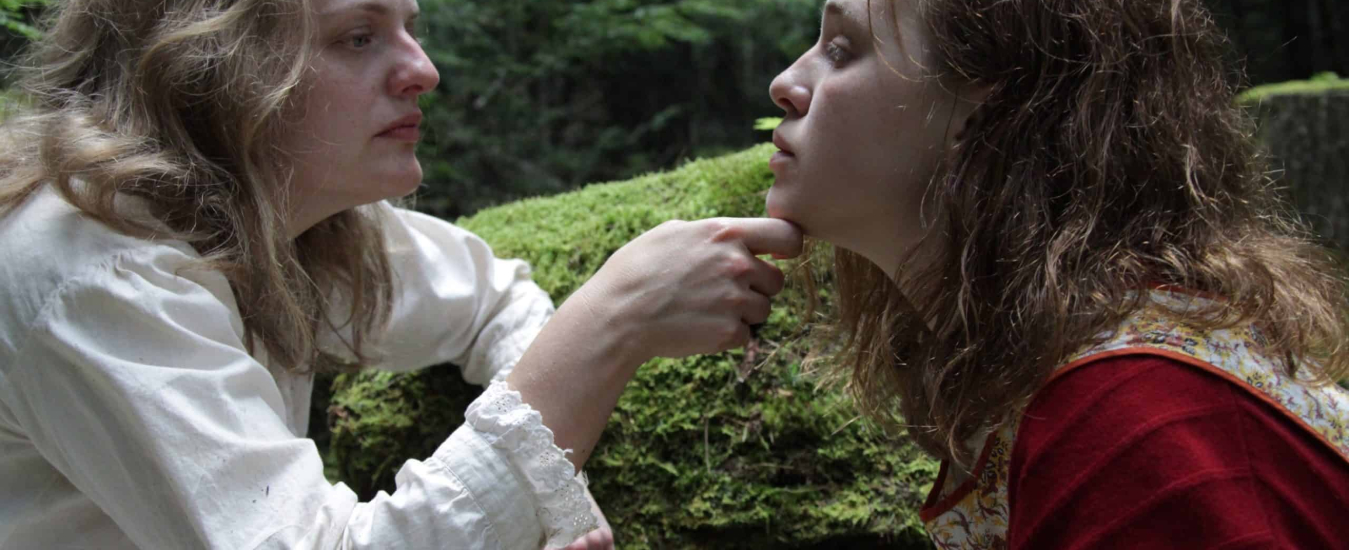

Berlinale 2020: Stylishly Wicked and Devastating, ‘Shirley’ is a Triumph
By Allison Krupp . February 24, 2020
Arresting psychological drama Shirley stuns at Berlinale 2020.
Josephine Decker’s psychological drama, Shirley, weaves together achy emotional worlds with stunning finesse, each moment of the tensely-plotted and painterly-gorgeous film inching forward toward one metaphorical heart-wrenching scream. It is a story of entrapment, of disappearing within one’s self or in the shadow of others—and finding new ways to go on.
Shirley is the real-life famous and feared writer Shirley Jackson (a mesmerizing Elisabeth Moss), middle-aged, dumpy, cheeks sagging, yet eyes direct and glittery and evil. In the film, as in much of her life, she refuses to leave the house she shares with her husband, Professor Stanley Hyman (Michael Stuhlbarg, the father in Call Me By Your Name—who could really play a professor in anything), and frequently takes to her bed for weeks at a time, cigarette-puffing and stirring in panicked thoughts. She’s clearly a genius, the sort that hasn’t brushed her hair in years and likes to live in her own soil—and, in one (of many) memorable scene, bemoans that only the mediocre, the idiotic creatures of this world have the strength to keep their homes clean.
The story begins with Rosie (Odessa Young) and Fred (Logan Lerman), newlyweds. They’re advertisement-ready, bright-toothed and beautiful, surging toward their soon-life of mid-’60s picket fences and 2.5 children. En route to stay with Shirley and Stanley, as Fred will work under Stanley at the university (and recently lost his inheritance for marrying Rosie), Rosie reads Shirley’s gut-wrenching, horribly exhilarating short story “The Lottery” in The New Yorker, perhaps in preparation for Shirley, or morbid fascination with another life.
Back in 1948–for real, “The Lottery” generated more letters from The New Yorker readers than any story before or since. Many canceled their subscriptions, petrified, calling it “deranged.” For those who haven’t read: the story is about a town in which one person receives a black mark, designating him/her as the one to be stoned to allow for the ongoing well-being of everyone else. In the end, the woman is stoned to death by her children. I watched the movie adaptation when I was maybe six or seven years old, and it’s always stuck with me: these grisly childish faces, their tiny hands gripping mighty stones and thrusting them toward soft flesh. But in the ’40s, ’50s, ’60s–even now–what sort of woman could have crafted this horrific tale?
When Fred and Rosie enter the Jackson/Hyman home, Rosie’s newly pregnant, her eyes glowing, her hair perfectly curled, and her sweater sets marvelously paired. (Mid-way through the film she wears a gorgeous white blouse with a red R stitched into the center, like a child.) Due to their housekeeper’s recent departure, Hyman requests that the young couple stay for a while, with Rosie taking on household duties. Naturally, the snarky, miserable Shirley finds incredible fault with the smiley Rosie. But as their husbands thrive with the necessary power they receive as professors at the university, the two women find themselves alone at home.
Shirley begins a novel about a girl, Paula, who recently went missing at the university. Paula was 19, alone, pretty–and although Shirley is fascinated with her, she struggles with a hefty bout of writer’s block. But here is this other girl, Rosie: sensual lips, youthful, yet increasingly alone as her husband drips away and her belly bulges. Rosie becomes Shirley’s muse, the one she dreams of and for. Fiction folds into reality, and Shirley draws Rosie deeper into her chaotic universe. Both women, stirring in their own powers at home alone, buck from their husbands’ perceived realities—their beliefs that they, alone, have power over their women—and create a separate universe for themselves. It’s messy and at-times deranged, entirely creepy, this strange relationship-structure in this old, creaky house covered in ivy. But the films beams with real heart.
We’re fascinated with madness, most notably with writers who are mad—and even more, perhaps, with women writers who go mad. But the film never leans on this trope, and instead crafts a far more nuanced look at this magnificent woman and her capacity to care and love, despite everything.
Masterful director Josephine Decker’s scenes are wrought with tension; each set teems with impossibly beautiful imagery. And Young and Moss play off of one another in a way that echoes one beautiful truth—we love those we love for no logical reason. And we must play games to survive.






